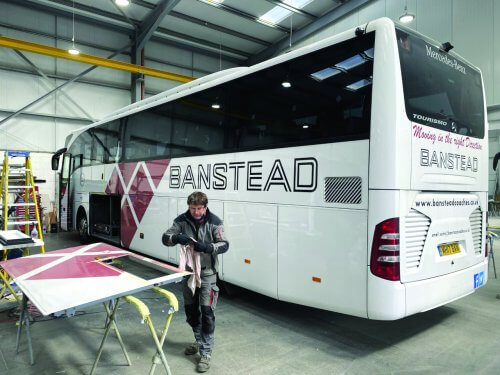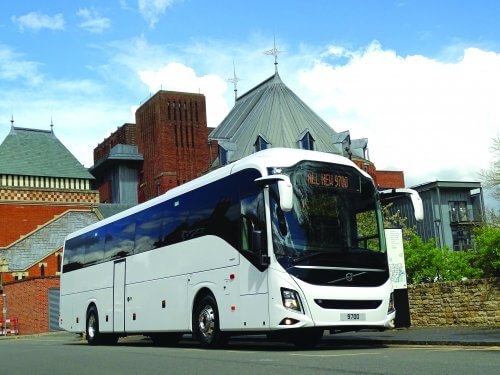
As the PSVAR compliance situation deepens, Baroness Vere suggests that further coach industry functions could enter scope
In a letter to industry trade bodies, Minister for Roads, Buses and Places Baroness Vere of Norbiton has set out the Department of Transport’s plan to move forward on the issue of PSVAR compliance.
In a strongly worded introduction, the Baroness made clear that the Department’s view remains that the industry has ‘failed to comply.’ “Over the past year my Hon Friend, the Transport Accessibility and Rail Minister, Chris Heaton-Harris, has written to transport industry representatives on several occasions,” she wrote, “expressing his deep dissatisfaction at operators’ continued failure to comply with the Public Service Vehicles Accessibility Regulations 2000 (PSVAR) in the home-to-school and rail replacement sectors. The Regulations have revolutionised disabled people’s access to local buses and long-distance coaches, but it is unacceptable that, two decades after their introduction, a lack of compliant coaches continues to prevent disabled school pupils and railway passengers from travelling on the same services as non-disabled people. It cannot be right that in 2021 disabled people can still be required to use segregated services regardless of their wish, or otherwise, to do so, and I am determined that this will change.”
The Baroness continued by saying that local authorities, schools, colleges and transport operators must focus now on how they can provide services inclusively rather than seeking to avoid their legal obligations. “It is my firm view, supported by our statutory advisors, the Disabled Persons’ Transport Advisory Committee, that disabled people must have the right to travel like anybody else, and that organisations commissioning and operating services must play their part in making this possible. To this end, I am writing not only to explain our longer-term plans for ensuring that bus and coach services are available to all, but also to ask the industry to focus now on what it can do to ensure that services today are provided inclusively.”
As part of its ‘Bus Back Better’ National Bus Strategy for England, the Government committed to complete a review of PSVAR by the end of 2023 to ensure that the accessibility of coach and bus services ‘continue to be informed by the needs and expectations of disabled passengers’ for the foreseeable future. The Baroness said she knows that the industry and its representative bodies will be eager to participate in that process and looked forward to their support.
Private hire changes?
“I am however also aware that PSVAR does not currently cover every service that a disabled person might seek to use, and that the exclusion of vehicles used for private hire work may have contributed to a lack of compliant vehicles available for home-to-school and rail replacement services,” she continued, before going on to suggest that other forms of coach travel may be brought into the scope of the Regulations in due course. “Disabled people should be able to take coach holidays or to join their clubs and societies on days out without having to procure alternative transport, potentially at higher rates, and I have asked officials, as part of the review, to consider specifically how such services could be brought within scope of the Regulations. I understand that wheelchair lifts are sometimes removed from coaches when they cease to provide scheduled services and have asked my officials also to explore whether this practice can be stopped, including in law.”
On the issue of home to school and rail replacement services, the Baroness continued: “Whilst I recognise reluctantly that exemption from some PSVAR provisions cannot be avoided until there are sufficient compliant vehicles to meet demand, I am clear that such exemptions must not incentivise operators to stop investing in their fleets, and nor should they support delaying the making of accessibility improvements where doing so now is feasible. I have therefore asked officials to develop plans for medium-term exemptions to begin in 2022, available only to operators which can demonstrate the steps they have taken proactively to provide compliant services. Whilst eligibility rules will be communicated in due course, and subject to consultation, I have asked my officials to explore only providing exemptions for the wheelchair requirements (Schedule 1 of the Regulations) and not for steps, gangways, handrails, etc (Schedule 3), unless some of the requirements in Schedule 3 cannot reasonably be complied with in the time available. Operators may also be expected to operate a minimum number of fully compliant vehicles in order to be eligible for any exemption. All operators should begin planning now if they anticipate requiring exemptions from 2022 onwards. The 2022 exemptions will replace any exemptions issued to date.”
In the shorter term, starting from August 2021, in order to enable essential school services to continue operating she said the Government will consider applications for temporary exemptions (Special Authorisations) until 31 March for closed door home to school services, on the same terms as exemptions offered in summer 2020.
Operators which may need to apply for these exemptions should email the Department as soon as possible on [email protected] in order to be informed when application arrangements are released. Train Operating Companies will be informed of any further arrangements for rail replacement services through the Rail Delivery Group.
‘Not right’
“Twenty one years after PSVAR were introduced it cannot be right that disabled people still cannot travel as easily or confidently as non-disabled people, or without incurring additional cost,” the Baroness continued. “The exemptions we are offering are essential to enable vital services to run but they must not be used as a licence to discriminate. Train Operating Companies will still be expected to provide rail replacement services using compliant vehicles wherever possible, and I will write separately to the Rail Delivery Group specifying my continuing expectations of the rail industry and the requirements on them. Local authorities, schools and colleges must also take responsibility for procuring inclusive services.
“We will work with the Department for Education and the Devolved Administrations to inform commissioners of home to school services of our expectations, and to remind them of their legal equalities’ duties, with which they remain responsible for complying with.”
She concluded by saying: “I welcome the trade bodies’ efforts to consider how bus and coach services can meet the needs of all their passengers including, for instance, taking proactive steps to investigate more inclusive approaches for providing step-free access to high-floor coaches. My officials stand ready to discuss the application of PSVAR with you further, and I hope that you will continue to work with us, helping your members to understand our expectations, harnessing their collective knowledge and expertise, and thinking creatively about solutions to the challenges that disabled people continue to face. Breaking down the barriers that still prevent disabled people living the lives they want to is the duty of each of us, rather than someone else’s problem – and we must all do our bit to provide transport that enables access and promotes independence, helping disabled people to fulfil their potential. I trust I can rely on your support to make this happen.”
Response
Commenting on the letter, the CPT said: “The confirmation of a further exemption for home to school services ensures operators can continue to provide home to school transport across the country. “It is now important that the Department for Transport works urgently with the industry to develop medium term exemptions so that operators can make appropriate investments over the coming months. These exemptions should also reward those who have already invested in PSVAR-compliant vehicles. The pandemic has significantly limited operators’ ability to invest and any long-term arrangements to bring all coach services into scope must be forward looking, avoiding the need for costly retrofit of coaches bought in good faith. We look forward to working with officials and ministers to develop their proposals further as well as alongside the industry to develop improved ways of delivering the inclusive travel which the industry wholeheartedly supports.”


